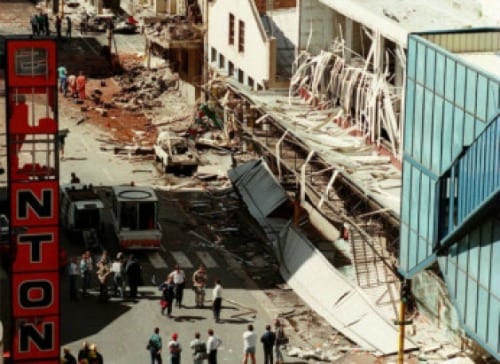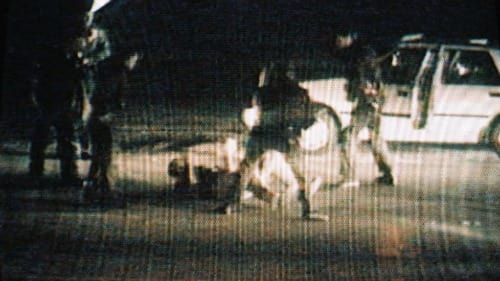On the eve of elections in South Africa that would end minority White rule, a car bomb exploded (pictured) near the national and regional headquarters of the African National Congress (ANC) buildings. Of the nine persons killed, Susan Keane was an ANC official running as a candidate for a provincial assembly seat in the Johannesburg-Pretoria region. The blast occurred on this day in 1994, marking a series of bombing campaigns thought to be enacted by White-ring opponents of Blacks being allowed to vote.
SEE ALSO: Liberian President William Tolbert’s Staff Executed On This Day in 1980
Keep Up With Face2Face Africa On Facebook!
Although no one claimed responsibility for the bombing, car bombs and other terrorist tactics were the hallmark of White separatist groups who were unwilling to lose their ruling power in the country. President F. W. de Klerk and his ANC opponent and eventual victor Nelson Mandela just concluded their campaign runs in the nation. Up until the bombing, unrest heading in to the election had been oddly minimal.
All of that changed the morning of April 25th as the blast ripped a huge crater in the streets between the ANC buildings in central Johannesburg. Along with the nine people killed, 92 others were injured. The bombing incited panic and fear in Black voters, which some speculate was the impetus of the attack.
As reported then by the Los Angeles Times:
Police said up to 200 pounds of explosives had been packed in or under a beige Audi that was parked on a corner. “Without any doubt, this is the biggest bomb that ever went off in Johannesburg,” said Col. Steve Senekal, the police spokesman.
“I thought it was the end of the world,” said a still-shaking Stephen Murugan, 48, manager of a bar in the 90-room Diplomat Hotel, across the intersection from the blast. Every window in the 10-story building was broken.
The toll of dead and injured rose throughout the day as firefighters, police officers and civil defense teams searched nearby offices and apartments. Because it was Sunday, the streets had been relatively quiet and most of the shops were shuttered. Police said no warning was given.
Experts in the nation on White extremists alleged that the bomb was fashioned after Irish Republican Army attacks in England and Northern Ireland. The sophistication of the attack was unlike anything the region has seen, and was just the sign of other bombings to come.
Watch news coverage of Susan Keane’s death by the bombing here:
On the following day, a 220-pound bomb went off near a busy taxi stand in Germiston, which killed 10 people. Another bomb tossed in to a Pretoria restaurant filled with Blacks that same day killed two people. President de Klerk denounced the violent bombings in public statements, saying, “We will not rest until they have been tracked down, convicted and punished, as they deserve.”
A White suspect in the Germiston and Johannesburg was arrested and questioned, and an anonymous White-ring leader claimed responsibility and said more attacks were imminent. ANC President Mandela visited the injured in Johannesburg and addressed reporters the day of elections.
“I hope the government acts in a way to remove the impression that it is a government of weakness unable to rise to the challenge that is posed by madmen who are killing innocent people,” said Mandela.
The ANC party won the election by a landslide, vanquishing President de Klerk’s National Party by millions, thus crowning Mandela as the nation’s first Black president.
SEE ALSO: Liberian Exodus From America To Africa Began On This Day In 1878











